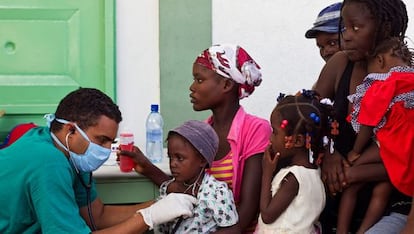Health officials fear cholera epidemic has spread to American continent
Mexico reports 171 cases of infectious disease that come from outbreak in Haiti three years ago

The cholera epidemic that broke out in Haiti three years ago and spread to neighboring Dominican Republic and Cuba has reportedly begun to penetrate the American continent. Up until last week, 171 cases of the infectious disease have been reported in Mexico while outbreaks have occurred in Venezuela and as far away as Chile.
Pan American Health Organization (PAHO) officials have warned that cholera could spread across the Americas and become a major global threat.
Cholera bacteria are often found in contaminated food and water, and the disease affects mostly impoverished communities that don’t have sufficient sanitary conditions. It attacks the small intestine and it symptoms are watery diarrhea, that can rapidly lead to dehydration, vomiting and fever. One in 20 cases turns severe.
From September 8 to October 18, Mexican health officials reported 171 confirmed cases, including one death, from cholera. Of the confirmed cases, two were in the Federal District while others are spread out in Hidalgo, Veracruz, Mexico and San Luis Potosí states. Thirty-nine patients have had to be hospitalized, according to the Mexico International Health Regulations (IHR) National Focal Point (NFP). In Hidalgo, health investigators said that river water was the source of the contamination.
Since a cholera epidemic broke out in Mexico in the 1990s, no new cases had been reported until this year. However, this strain is different from the previous one and “presents high similarity (greater than 95 percent) with the strain that is currently circulating in three Caribbean countries (Haiti, Dominican Republic and Cuba),” the PAHO said in a bulletin issued on October 19.
"It is really, for us, a defining moment," said PAHO deputy director Dr Jon Andrus, in an interview broadcast Wednesday on NPR. "To what extent are we concerned about spread? Well, it's really a regional threat and now a global threat to health."
In October 2010, a cholera outbreak in Haiti spread across the Caribbean, killing 8,874 people. The first case was reported in the Haitian town of Saint Marc, a few hours by car from the capital Port-au-Prince.
In a few days, the epidemic spread throughout a river valley in Artibonite province where people get their water from the same source. Haitian government officials immediately blamed a group of soldiers from a UN peacekeeping mission, who were stationed nearby, for contaminating the river with fecal matter.
Up until October 12, 8,413 people in Haiti have died from cholera, according to Haitian health authorities.
In neighboring Dominican Republic, which shares the island of Hispaniola, there have been 31,070 cases reported. Of that number 458 people have died since the outbreak began a month after it did in Haiti.
“The provinces of Puerto Plata, San Juan, Santiago and Santo Domingo account for 64 percent of the suspected cases registered in the last four epidemiological weeks,” PAHO said in its bulletin. “The case-fatality rate in 2013, of 2.1 percent, remains higher than that of 2011, [which reached] 1.7 percent, and of 2012, with 0.8 percent.”
Cholera has also spread to Cuba, but authorities have not publicly stated the number of cases in all, but no new cases have been reported since August. The official case figure is 678, including three deaths, and outbreaks have been reported in the provinces of Camagüey, Granma, Guantánamo, and Santiago de Cuba – on Cuba’s eastern coast near Haiti – and the capital Havana.
According to PAHO, at least five citizens from Venezuela, Chile and Italy, who had traveled to Cuba, have carried the bacteria back to their home countries.
Tu suscripción se está usando en otro dispositivo
¿Quieres añadir otro usuario a tu suscripción?
Si continúas leyendo en este dispositivo, no se podrá leer en el otro.
FlechaTu suscripción se está usando en otro dispositivo y solo puedes acceder a EL PAÍS desde un dispositivo a la vez.
Si quieres compartir tu cuenta, cambia tu suscripción a la modalidad Premium, así podrás añadir otro usuario. Cada uno accederá con su propia cuenta de email, lo que os permitirá personalizar vuestra experiencia en EL PAÍS.
¿Tienes una suscripción de empresa? Accede aquí para contratar más cuentas.
En el caso de no saber quién está usando tu cuenta, te recomendamos cambiar tu contraseña aquí.
Si decides continuar compartiendo tu cuenta, este mensaje se mostrará en tu dispositivo y en el de la otra persona que está usando tu cuenta de forma indefinida, afectando a tu experiencia de lectura. Puedes consultar aquí los términos y condiciones de la suscripción digital.









































